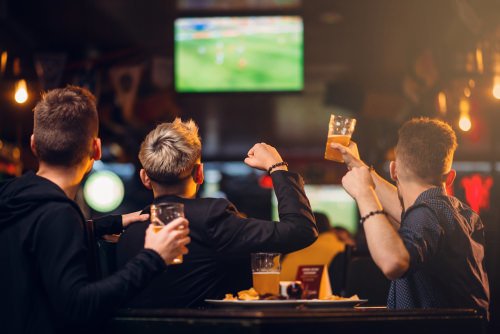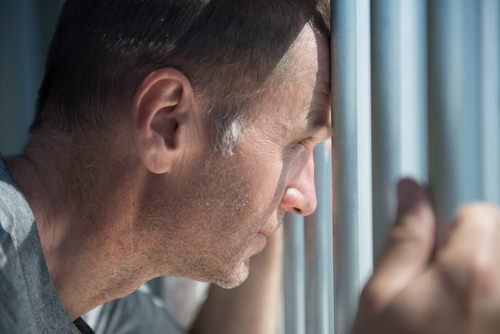Business and Professions Code 25665 makes it a crime for a minor to be allowed on the premises of a bar or nightclub where alcohol is sold for consumption. A violation is a misdemeanor punishable by up to 6 months in jail and fines of up to $1000.00.
The language of the statute reads that:
25665. Any licensee under an on-sale license issued for public premises, as defined in Section 23039, who permits a person under the age of 21 years to enter and remain in the licensed premises without lawful business therein is guilty of a misdemeanor. Any person under the age of 21 years who enters and remains in the licensed public premises without lawful business therein is guilty of a misdemeanor and shall be punished by a fine of not less than two hundred dollars ($200), no part of which shall be suspended.
The code section penalizes both the bar/nightclub and the minor.
Examples
- a nightclub does not check for IDs at the door and ends up letting in several patrons that are under the age of 21.
- Chantel, age 20, sneaks into a bar and socializes with other customers for the night.
- a bouncer of a club lets his friend in even though the friend is only 19.
Defenses
Luckily, there are several legal defenses that a person can raise if accused of a crime under this section. These include showing that an accused party was:
- not an on-sale premise;
- conducting lawful business; and/or,
- was arrested without probable cause.
Penalties
The owner of a bar or club that violates the statute in question will be charged with a misdemeanor (as opposed to a California felony or an infraction). The crime is punishable by:
- imprisonment in the county jail for up to six months; and/or,
- a maximum fine of $1,000.
A minor that violates the statute will be charged with a misdemeanor. The crime is punishable by a maximum fine of $200.
Our California criminal defense attorneys will explain the following in this article:
- 1. Is it a crime to allow minors where alcohol is served?
- 2. Are there defenses to Business & Professions Code 25665?
- 3. What are the potential consequences?
- 4. Related offenses

California Business and Professions Code 25665 is the California statute that makes it a crime for a minor to be on the premises of a bar or nightclub.
1. Is it a crime to allow minors where alcohol is served?
California Business and Professions Code 25665 BPC makes it a crime for either:
- a bar or club to allow a minor on the establishment’s premises; or,
- a minor to enter the premises of a bar or club.
Please note that both an establishment and a minor can violate this code section.
For a prosecutor to show that a business violated this statute, he must prove that the owner of a bar or club:
- was licensed to sell alcohol for consumption on the premises; and,
- it allowed a minor under the age of 21 to enter and remain in the bar/club.1
For a prosecutor to show that a minor violated the law, he must prove that the minor:
- was under the age of 21; and,
- entered and remained in the bar/club without lawful business inside.2
This law applies to “on-sale premises.” California law defines an “on-sale premise” as an establishment that is licensed to sell beer, wine, and distilled spirits for consumption on the premises where they are sold.3 This typically means a bar or nightclub.
2. Are there defenses to Business & Professions Code 25665?
A person accused can challenge the accusation by raising a legal defense. A good defense can often get a charge reduced or even dismissed. Please note, though, that it is critical for an accused to hire an attorney to get the most effective defense.
Three common defenses are:
- not an on-sale premise;
- conducting lawful business; and/or,
- no probable cause.
2.1. Not an on-sale premise
Please recall that Business and Professions Code 25665 only applies to “on-sale premises” (as defined above). This means it is a legal defense for an establishment to show that while it allowed a minor on its premises, it was not in fact an “on-sale premises.” This would apply, for example, to most liquor stores.
2.2. Conducting lawful business
Also recall, that in regard to a minor violating this section, a prosecutor must show that he entered and remained in a bar/club “without lawful business inside.” This means a person under the age of 21 can still enter a bar if he has some lawful business inside the establishment. A good example here is a minor that is legally aiding in the delivery of a keg, or cases of wine, to a club or bar.
2.3. No probable cause
The Fourth Amendment to the U.S. Constitution says that police must have probable cause before they can detain or arrest a suspect of a crime.
If a person was stopped or arrested, and there was no probable cause, then any evidence obtained following the improper stop/arrest could get excluded from the case. This exclusion could result in the dismissal or reduction in charges.
“Probable cause” essentially means that there is a reasonable belief that someone committed a crime (based on all of the circumstances).

A violation of this law can result in jail time and/or a fine.
3. What are the potential consequences?
The owner of a bar or club that violates BPC 25665 will be charged with a misdemeanor. The offense is punishable by:
- imprisonment in the county jail for up to six months; and/or,
- a maximum fine of $1,000.4
Please note that in lieu of jail time a judge may order a defendant to misdemeanor probation. This is also called “summary” or “informal” probation.
A minor who violates this section will be charged with a misdemeanor as well. The crime is punishable by a maximum fine of $200.5
4. Related Offenses
There are three crimes related to permitting a minor in a place where alcohol is consumed. These are:
- minor possessing or presenting a fake ID – BPC 25661;
- minor in possession of alcohol – BPC 25662; and,
- soliciting sale of alcohol – BPC 25657(a).
4.1. Minor possessing or presenting a fake ID – BPC 25661
California Business and Professions Code 25661 makes it a crime for a minor to possess or present a false identification card.
A person is guilty under BPC 25661 if he is under the age of 21 and either:
- presents a fraudulent ID to a business for the purpose of buying, or attempting to buy, alcohol; or,
- possesses a false or fraudulent identification card.6
A violation of Business and Professions Code 25661 is charged as a misdemeanor.7 The offense is punishable by a maximum fine of $200.8
4.2. Minor in possession of alcohol – BPC 25662
Business and Professions Code 25662 BPC is the California statute governing the possession of alcohol by minors when in a public place.
A prosecutor must prove three things to successfully show that a minor is violating BPC 25662. These are:
- The defendant was under the age of 21 (at the time of the incident);
- The defendant possessed an alcoholic beverage; and,
- The defendant was on a street, highway, public place, or a place open to the public.9
A first-time violation of BPC 25662 is treated as a California infraction. The offense is punishable by:
- a fine of $250, or
- 24-32 hours of community service.10
A second or subsequent violation of BPC 25662 is charged as a misdemeanor. The offense is punishable by:
- a maximum fine of $500, and/or
- 36-48 hours of community service.11
4.3. Soliciting sale of alcohol – BPC 25657(a)
Business and Professions Code 25657(a) is the California statute that makes it a crime for the owner of a bar or club to hire or pay someone to solicit alcohol.
BPC 25657(a) says it is a criminal offense for a bar or club to:
- employ a person to directly solicit the purchase of alcoholic drinks; or,
- pay such a person a commission on the sale of alcoholic drinks.12
Please note that “solicit,” in the context of this statute, means to urge or request someone to drink alcohol.
Like Business and Professions Code 25665, BPC 25657(a) applies to “on-sale premises.” Again, California law defines an “on-sale premise” as an establishment that is licensed to sell beer, wine, and distilled spirits for consumption on the premises where they are sold.13 This typically means a bar or nightclub.
A violation of BPC 25657(a) is charged as a misdemeanor. The crime is punishable by:
- imprisonment in the county jail for up to six months; and/or,
- a maximum fine of $1,000.14
Legal References:
- California Business and Professions Code 25665 BPC.
- See same.
- California Business and Professions Code 23399 BPC.
- California Business and Professions Code 25617 BPC.
- California Business and Professions Code 25665 BPC.
- California Business and Professions Code 25661 BPC.
- See same.
- See same.
- California Business and Professions Code 25662(a) BPC.
- California Business and Professions Code 25662(a) BPC.
- See same.
- California Business and Professions Code 25657(a) BPC.
- California Business and Professions Code 23399 BPC.
- California Business and Professions Code 25617 BPC.
